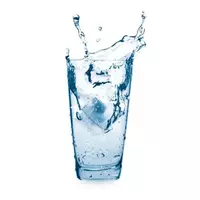Mineral water

Today, the mineral water market, along with drinking water, represents one of the fastest growing consumer areas in our country. Interestingly, these products account for up to 70 percent of the entire soft drinks market.
Mineral water is water containing trace elements, dissolved salts and some biologically active elements. Like the canteen water, it is used for resort and sanatorium treatment, as well as simply for consumption. For sale, mineral water is poured into containers of different volumes and quite often artificially carbonated. Despite the fact that the nutritional value and calorie content of mineral water is almost zero, this is a very healthy drink.
Mineral water composition
The composition of mineral water directly depends on its purpose, but primarily it contains six main elements: sodium, sulfate, magnesium, calcium, chlorine, as well as hydrocarbonate. Based on this, there are such types of mineral water as chloride, hydrocarbonate, sulfate and some others.
In addition, an important component of this beverage is carbon dioxide, also included in mineral water. It is due to the interaction of underground rocks with carbon dioxide that the healing properties of mineral water are formed.
Types of mineral water
In addition to the composition, mineral water can also vary in temperature: cold (less than 20 ° C), subthermal (from 20 to 37 ° C), thermal (from 37 to 42 ° C) and hyperthermal (over 42 ° C).
And finally, there is a classification by the quantitative content of mineral salts, according to which 3 types of mineral water are distinguished: canteen, canteen and medical. The first is great for daily consumption, as it tastes quite pleasant and does not have a pronounced smell and taste. Quite often it is used in cooking.
Medical-table mineral water refers to universal drinks, due to the fact that it can be used not only as a table, but also as a medical drink.
Medicinal mineral water is characterized by the maximum degree of mineralization or an increased content of certain active elements, therefore it is recommended to use it strictly dosed and exclusively as prescribed by the doctor.
Mineral water benefits
Despite the fact that each type of this drink has its own healing properties, in general, the benefits of mineral water for humans are obvious. For example, hydrocarbonate water is indicated in urolithiasis. The use of chloride water favorably affects the functioning of the gastrointestinal tract and stimulates the metabolic processes in the body.
The benefits of mineral water, which is saturated with sulfates, lie in the ability to stimulate the work of the gallbladder and liver. Due to the presence of such qualities, it is advised to use it for diseases of the biliary tract, in the case of chronic hepatitis, obesity and diabetes mellitus.
Damage to mineral water
Today, mineral water is not only extracted, but also created by its analogues by enriching ordinary tap water with salts, minerals and carbon dioxide. Such water, although it meets the requirements of GOST, but in its properties it is not comparable to natural mineral water, since it is a kind of salt solution, and not an active living medium. It makes no sense to talk about the dangers of mineral water of artificial origin due to the fact that it absolutely does not threaten human health, but it is also difficult to call it useful.
mineral water 0.1 kCal
Energy value of mineral water (Ratio of proteins, fats, carbohydrates - ju):
Proteins: 0 g (~ 0 kCal)
Fats: 0 g (~ 0 kCal)
Carbohydrates: 0.1 g (~ 0 kCal)
Energy ratio (b | y): 0% | 0% | 400%
 Español
Español Français
Français Português
Português Русский
Русский 简体中文
简体中文 繁體中文
繁體中文 日本語
日本語 한국어
한국어 العربية
العربية Türkçe
Türkçe Қазақ
Қазақ Deutsch
Deutsch Italiano
Italiano Українська
Українська
